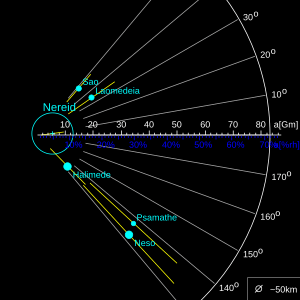Neso (moon) facts for kids
Neso, also known as Neptune XIII, is the moon farthest from Neptune. It is not perfectly round like Earth's Moon. Scientists Matthew J. Holman and Brett J. Gladman found it on August 14, 2002. However, they didn't officially notice it until 2003.
Contents
Neso's Amazing Journey
Neso travels around Neptune at a huge distance. It is more than 48 million kilometers away! This makes Neso the farthest known moon of any planet in our solar system.
A Wobbly Path
Neso's orbit, or path around Neptune, is quite unusual. It is very inclined, meaning it's tilted a lot compared to Neptune's equator. It is also very eccentric, which means its path is not a perfect circle. Instead, it's more like a stretched-out oval. The diagram shows how Neso's path compares to other moons around Neptune.
What is Neso Like?
Neso is about 60 kilometers wide. To give you an idea, that's roughly the size of a small city. Scientists believe it has a density of about 1.5 grams per cubic centimeter. This means it's not as dense as a rock, but heavier than water.
How Heavy is Neso?
Based on its size and density, Neso's mass is estimated to be about 1.6 x 1017 kilograms. That's a huge number, but it's still very small compared to Earth's Moon.
A Moon That Broke Apart?
There's another moon of Neptune called Psamathe. Scientists have noticed that Neso and Psamathe have very similar orbits. Because of this, some scientists think that Neso and Psamathe might have once been part of a larger moon. This bigger moon could have broken apart a long time ago, forming these two smaller, non-spherical moons.
How Neso Got Its Name
Neso is named after one of the Nereids. In ancient Greek myths, the Nereids were sea nymphs, or spirits of the sea. Before it got its official name on February 3, 2007, Neso was known by a temporary name: S/2002 N 4.
See also
 In Spanish: Neso (satélite) para niños
In Spanish: Neso (satélite) para niños
 | May Edward Chinn |
 | Rebecca Cole |
 | Alexa Canady |
 | Dorothy Lavinia Brown |


